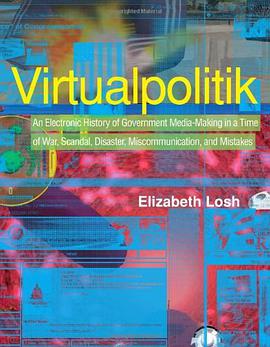

具体描述
Today government agencies not only have official Web sites but also sponsor moderated chats, blogs, digital video clips, online tutorials, videogames, and virtual tours of national landmarks. Sophisticated online marketing campaigns target citizens with messages from the government--even as officials make news with digital gaffes involving embarrassing e-mails, instant messages, and videos. In Virtualpolitik, Elizabeth Losh closely examines the government's digital rhetoric in such cases and its dual role as mediamaker and regulator. Looking beyond the usual focus on interfaces, operations, and procedures, Losh analyzes the ideologies revealed in government's digital discourse, its anxieties about new online practices, and what happens when officially sanctioned material is parodied, remixed, or recontextualized by users. Losh reports on a video game that panicked the House Intelligence Committee, pedagogic and therapeutic digital products aimed at American soldiers, government Web sites in the weeks and months following 9/11, PowerPoint presentations by government officials and gadflies, e-mail as a channel for whistleblowing, digital satire of surveillance practices, national digital libraries, and computer-based training for health professionals. Losh concludes that the government's "virtualpolitik"--its digital realpolitik aimed at preserving its own power--is focused on regulation, casting as criminal such common online activities as file sharing, video-game play, and social networking. This policy approach, she warns, indefinitely postpones building effective institutions for electronic governance, ignores constituents' need to shape electronic identities to suit their personal politics, and misses an opportunity to learn how citizens can have meaningful interaction with the virtual manifestations of the state.
作者简介
目录信息
读后感
评分
评分
评分
评分
用户评价
相关图书
本站所有内容均为互联网搜索引擎提供的公开搜索信息,本站不存储任何数据与内容,任何内容与数据均与本站无关,如有需要请联系相关搜索引擎包括但不限于百度,google,bing,sogou 等
© 2026 book.wenda123.org All Rights Reserved. 图书目录大全 版权所有




















